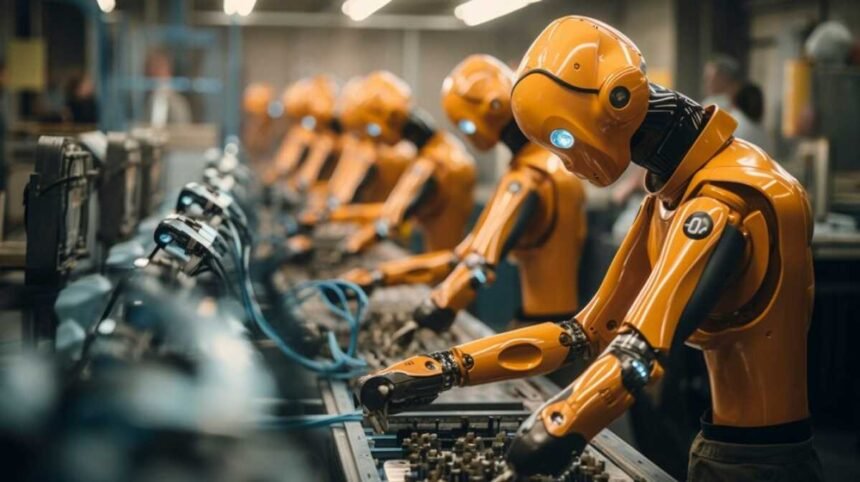Key Takeaways
- Discover the latest trends enhancing the industrial manufacturing sector.
- Understand the importance of technology in modern manufacturing processes.
- Learn how sustainability and customization are reshaping the industry.
The Rise of Automation and Robotics
The industrial manufacturing sector has seen a considerable shift with the integration of automation and robotics. With advanced machines taking over manual tasks, companies are experiencing increased efficiency and reduced error rates. For example, collaborative robots, or cobots, in manufacturing settings have significantly increased productivity and safety when they operate alongside human operators. By handling dangerous or monotonous duties, these cobots free human workers to concentrate on more intricate and valuable jobs.
Moreover, adopting CPQ for manufacturing helps streamline the configuration, pricing, and quotation processes. This integration enhances efficiency on the shop floor and throughout the entire sales and production cycle. By reducing the time and resources needed to quote and configure products, companies can respond more swiftly to customer demands and market changes.
Adoption of IoT and Smart Manufacturing
Manufacturing systems are being revolutionized by Internet of Things (IoT) technologies. By linking equipment and devices, manufacturers may gather and evaluate data in real-time, resulting in preventive maintenance and increased operational effectiveness. IoT-enabled systems allow for better inventory management, reducing downtime and ensuring seamless production processes. Furthermore, IoT-enabled real-time data enables quick modifications to the manufacturing process, guaranteeing peak performance constantly. This skill lowers waste while raising the created goods’ general caliber.
Consider a manufacturing plant that has implemented smart factory technology. By integrating IoT sensors across the factory floor, the plant can monitor machine performance continuously. This has led to a significant reduction in unexpected breakdowns and improved the overall efficiency of operations. Such advancements highlight the tangible benefits of embracing smart manufacturing technologies. For example, real-time data can detect when a machine is about to fail, allowing for preventive maintenance that avoids costly downtime.
Embracing Sustainability and Eco-Friendly Practices
With growing environmental concerns, industrial manufacturers are increasingly prioritizing sustainability. This shift is seen in the adoption of energy-efficient systems and the use of recyclable materials. Additionally, manufacturers are investing in advanced technologies like carbon capture and renewable energy sources to minimize their carbon footprint. These efforts benefit the environment and meet the changing demands of eco-conscious consumers who prefer responsible brands and sustainable products. Manufacturers can also position themselves as industry leaders committed to responsible practices by promoting environmental sustainability.
Adopting sustainable practices can reduce expenses, improve brand recognition, and ensure compliance with environmental laws. For instance, companies that have switched to renewable energy sources have reported long-term energy cost savings.
Customization and Advanced Manufacturing Technologies
Customization has emerged as a vital competitive advantage in the industrial manufacturing sector. Contemporary manufacturing methodologies, including three-dimensional printing, enable enterprises to offer personalized products tailored to each client’s specifications. This trend toward mass customization satisfies the market’s desire for distinctive items, which also lessens waste from conventional manufacturing techniques. Rapid prototyping and production are made possible by these technologies, which let producers react swiftly to consumer feedback and market trends.
One noteworthy instance of customization made possible by cutting-edge technology is the production of personalized medical implants using 3D printing. Customizing these implants to a patient’s anatomy guarantees a better fit and quicker healing times. This degree of personalization was previously impossible to achieve using traditional production techniques. Furthermore, complicated geometries that are hard or impossible to create using conventional methods can be made with 3D printing, enabling new avenues for product design innovation.
Data Analytics and Predictive Maintenance
Modern manufacturing heavily relies on data analytics. By evaluating massive data sets, manufacturers can anticipate equipment breakdowns and carry out maintenance before problems develop. This predictive maintenance approach helps avoid costly downtime and prolongs the lifespan of machinery. Companies can also optimize their supply chains by analyzing data trends and making informed decisions. Predicting and preventing equipment failures can translate into significant cost savings and improved operational efficiency.
A leading automotive manufacturer implemented predictive maintenance using advanced data analytics. By continuously monitoring equipment performance, the manufacturer could predict when parts would fail and replace them before causing a breakdown. This significantly reduced downtime and maintenance costs, demonstrating the tangible benefits of predictive maintenance. By leveraging data analytics, the company not only improved its maintenance processes but also gained valuable insights into its machinery’s overall health and performance, enabling more effective long-term planning and resource allocation.
Enhanced Quality Control with AI
Artificial Intelligence (AI) is revolutionizing numerous industries, and quality control in manufacturing is no exception. Improved quality control with artificial intelligence (AI) combines cutting-edge technology like computer vision, machine learning, and data analytics to dramatically increase quality assurance procedures’ precision, effectiveness, and consistency.
Artificial Intelligence (AI) enhances quality control processes within the manufacturing industry. AI-powered systems can quickly detect product defects and deviations, ensuring higher quality standards. By implementing machine learning algorithms, manufacturers can continuously improve their quality control processes, reducing waste and increasing customer satisfaction. Artificial intelligence (AI) systems can evaluate enormous volumes of data significantly more quickly and reliably than human inspectors, enhancing the consistency and dependability of product quality.
An example of AI-driven quality control is in the electronics manufacturing industry. Companies are using AI systems to analyze images of circuit boards for defects. This technology can detect minute imperfections that might be missed by human inspectors, ensuring the highest quality standards are met. Implementing AI in quality control enhances the precision and speed of inspections and provides valuable data insights that can be used to refine manufacturing processes further.
Also Read: Elevate Business Presentations with AI-Powered Tool



